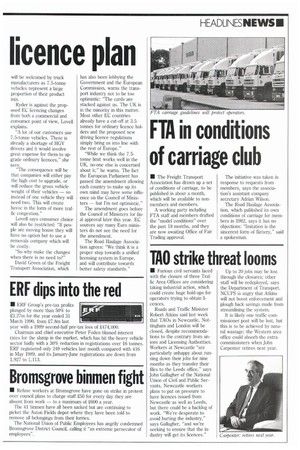licence plan
Page 7

If you've noticed an error in this article please click here to report it so we can fix it.
will be welcomed by truck manufacturers as 7.5-tonne vehicles represent a large proportion of their product mix.
Ryder is against the proposed EC licencing changes from both a commercial and consumer point of view, Lovell explains.
"A lot of our customers use 7.5-tonne vehicles. There is already a shortage of HGV drivers and it would involve great expense for them to upgrade ordinary licences," she says.
The consequence will be that companies will either pay the high cost to upgrade, or will reduce the gross vehicle weight of their vehicles — so instead of one vehicle they will need two. This will create havoc in the form of more traffic congestion."
Lovell says consumer choice will also be restricted: "If people are moving house they will have no option but to use a removals company which will be costly.
"So why make the changes when there is no need to?"
David Green of the Freight Transport Association, which has also been lobbying the Government and the European Commission, warns the transport industry not to be too optimistic: "The cards are stacked against us. The UK is in the minority in this matter. Most other EC countries already have a cut-off at 3.5 tonnes for ordinary licence holders and the proposed new driving licence regulations simply bring us into line with the rest of Europe."
"While we think the 7.5tonne limit works well in the UK, no-one else is concerned about it," he warns. The fact the European Parliament has passed the amendment allowing each country to make up its own mind may have some influence on the Council of Ministers — but I'm not optimistic."
The amendment goes before the Council of Ministers for final approval later this year. EC sources say many Euro ministers do not see the need for the amendment.
The Road Haulage Association agrees: "We think it is a proper step towards a unified licensing system in Europe, and will contribute towards better safety standards."




























































































